FREDERICO DE FREITAS
(1902-80)
Portuguese Composer
Five discs on the Portugalsom label
(allow time for images to load)
Biographical Profile
De Freitas's story is a familiar one in its pattern if not its detail. In
his own country he was extremely successful in the field of popular music.
He wrote for dance, film and theatre. Not content with this he produced a
large body of concert music amongst which the most intriguing is the Os
Jerónimos Symphony - a work not, as yet, recorded. While continuing
to compose, in his later years he wrote scholarly studies of Modinha and
Fado, forms of popular Portuguese song.
As a serious composer he was viewed with derision in orthodox circles because
of his achievements in popular music. Time after time we have seen the same
phenomenon in so many countries. He conducted widely including beyond the
Portuguese borders. In his sonata for violin and cello he introduced bitonality
to Iberian music. Although Lisbon-born he took a close interest in folk song
and dance and used these riches in his concert music and notably in his ballets.
Ballet was only one sphere in which he was active. He tracked through a very
wide range including opera, chamber music, solo piano, orchestral pieces
and song. His music leans towards a bright nationalism but in touch with
modern trends. He lacks the epic qualities of Luis de Freitas Branco and
Joly Braga Santos, both doughty symphonists, though of the two he is closer
to Braga Santos than to Branco.
Rob Barnett
Ribatejo (1934)
A Lenda dos Bailarins (The Legend of the Dancers) (1926)
O Muro do Derrête (The Love Wall) (1940)
African Suite (1936)
Poema sobre una Écloga Virgílio (1923)
 Orquestra Sinfónica
Nacional/composer
Orquestra Sinfónica
Nacional/composer
rec 1962, Radiodifusâo Portuguesa
 PORTUGALSOM STRAUSS SP
4081 [64.52]
PORTUGALSOM STRAUSS SP
4081 [64.52]
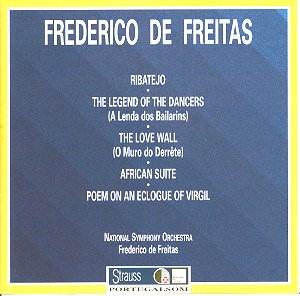
In this first disc the string section is not as luxurious as it should be.
The tangy Ribatejo features an Iberian viola meditation at 4.30 overall
given a Tchaikovskian balletic brightness. The score is garishly bright -
juicily Stravinskian.
The Legend of the Dancers is a grim tale of a group of sacrilegious
dancing revellers cursed by a priest to dance for a year. As the year elapses
the dancers fall, the women dead and the men weakened, shaken with palsy
and vacant of expression. The music is suitably possessed and persistent.
The Love Wall is much better played than its companions being forwardly
balanced and as populist in tone as Copland and touched with a sense of humour.
Highlights include a 'hot' latino trumpet vibrato. Petrushkan dispossessed
spirits and the ghosts of El Salon Mexico.
The African Suite (originally 'Colonial Suite') leans towards Dukas
(albeit with a 'game' tonality) and represent a European's impressions of
Africa rather than the perilous reality of African music evident in Braga
Santos's much later Fifth Symphony. De Freitas casts caution to the winds
in the Batuque - a pile-driver of a movement with the example of
Honegger's Pacific 231 clearly its model.
Finally innocence returns with the chaste simplicity of the Virgilian poem
predating the rather more knowing polytonal sonata for violin and cello.
Some may have difficulty with the NSO's distressed string section. Not the
place to start your de Freitas investigations.
Rob Barnett

Images of Earth and Sea (1943)
Nazaré (1948)
 Orquestra Sinfónica
Nacional/composer
Orquestra Sinfónica
Nacional/composer
rec 1975 and 1962, Radiodifusâo Portuguesa
 PORTUGALSOM STRAUSS SP
4242 [53.41]
PORTUGALSOM STRAUSS SP
4242 [53.41]
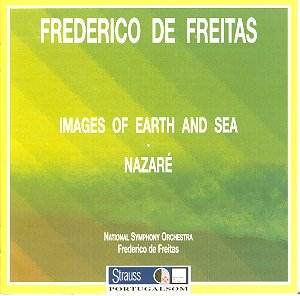
Ballet was, for de Freitas, a galvanic force, progenitor of many scores.
The two scores on this disc are the last two written for the Verde Gaio company
after The Love Wall. Only the Farsa de Ines Pereira is omitted
from these Portugalsom discs.
The Images score employs what may be termed 'nihilistic lyricism'
although a sense of continuity reasserts itself in the last eight or so minutes.
Like an ever-active mosaic the score proceeds in jewelled fragments flitting
through Straussian flourishes, Daphnis-like moments, louring shadows,
vital rhythmic figures steeped in folk dance and the warm contentment (15.18)
of marine sunsets. This is no museum piece and its sour atomised overlay
of extruded tonality prompts recollections of the instrumental writing in
Luciano Berio's Folksongs (remember the Cathy Berberian recording).
The recording is taken from a live concert, coughs and all, but, while the
woodwind are spry enough, the strings sound, yet again, less than luxurious.
Nazaré tells a story of love and jealousy in a small fishing
village. The sea imagery is much stronger here than in Images -
spiritually paralleling the music at the start of Lopes-Graca's Tragic
History of the Sea (also on Portugalsom). The notes claim cinematic qualities
for the music. I would not disagree. It is pleasingly episodic and - as in
Images - incessantly mobile. The 'St Vitus dance' chattering ideas
found in the symphonies of De Freitas Branco and Joly Braga Santos also appear
here. The strings are richer than in the 1970s recording of Images
although there is a trace of that 'brushing' distortion that can afflict
older tapes. This is a pity especially when the score passes through the
sort of storm Berlioz's Le Corsair would have relished.
Overall a small price to pay for some extremely approachable, good-humoured
and unfamiliar music. Some aural toleration is required.
Rob Barnett

Dança da Menina Tonta (Dance of the Foolish Girl)
(1940)
Medieval Suite (1959)
 Ploiesti Philharmonic
Orchestra/Carol Litvin
Ploiesti Philharmonic
Orchestra/Carol Litvin
rec 1978, Bucharest
 PORTUGALSOM STRAUSS
SP870012/PS [51.33]
PORTUGALSOM STRAUSS
SP870012/PS [51.33]
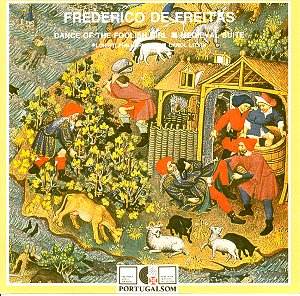
De Freitas's interest in ballet can be traced back to the impact made in
1918 by the visit of Diaghilev's Ballets Russes to Lisbon. The 'first children'
of this signal event were Bailado do Encantamento and Princesa
dos Sapatos de Ferro by Ruy Coelho (the latter available on another
Portugalsom CD).
The 24 minute Dance of the Foolish Girl is another of de Freitas's
string of ballets. It is in twelve sections but Portugalsom has, regrettably,
banded them as one. This ballet was written for Francis and Ruth Walden and
performed by them in Madrid, Paris, Brussels, Lausanne and Rio de Janeiro.
The music is like Respighi's 'toybox' music: dapper and highly coloured.
It is orchestrated with pellucid mastery taking something from Ravel's
Rhapsodie Espagnole as well as from the cold springs of folk music.
The Suite is, like all good suites, varied in mood. Here de Freitas is in
nationalistic mode. The music is tonal, charmingly approachable, rather like
superior quality British light music - think in terms of Maurice Johnstone's
Tarn Howes (irresistible and recently recorded by ASV) and
Vaughan Williams Variants on Dives and Lazarus. There are prime
roles for principal flute throughout and less frequently for the first violin.
The Electrecord recording is pretty fair if a little one-dimensional. The
accomplishments of the orchestra are superior.
I am still awaiting an explanation for the large number of Portugalsom discs
produced in Warsaw Pact countries by Iron Curtain orchestras - this disc
seems to be part of the same tendency - were the reasons political?
Rob Barnett

Quarteto Concertante - string quartet and string orchestra
(1945)
Flute Concerto (1954)
 Carlos Franco (flute)
Carlos Franco (flute)
Gábor Bohus (violin)
István Párkányi (violin)
Tamás Koó (viola)
J Kiss-Domonkos (cello)
Budapest PO/Gyula Németh
rec Dec 1981, Budapest
 PORTUGALSOM STRAUSS
SP4040 [72.06]
PORTUGALSOM STRAUSS
SP4040 [72.06]
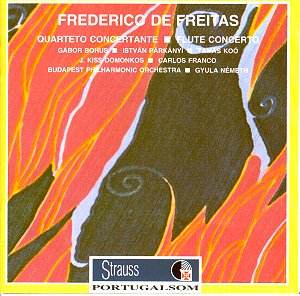
With this disc sound and performance attainments are far more secure. It
also so happens that this is the most generously timed of the five.
The Concertante is dusted with dissonance - mid-period Tippett or
Frankel rather than anything more aggressive. A neo-classical busy-ness
darts and gripes with Iberian impatience through the two allegros.
There is industrious and vital work from the solo quartet. You need to think
in terms of Blomdahl (perhaps softer than that), the Martinu Concerto for
string quartet and orchestra and the Tippett Corelli Fantasia. The
Bergian haunting of the long adagio is extremely impressive stung
into existence by the composer's anguish over the Second World War.
Flute concertos running to more than 30 minutes are unusual. This one plays
for 37 minutes and requires a flautist of some endurance as well as emotional
range. Two, mostly care-free, allegros sandwich a larghetto. The juicy
romance of this music is very strong and I can best liken the style to Richard
Rodney Bennett's Lady Caroline Lamb music although a militant Stravinskian
edginess enters in the finale.
A very strong disc and worthy of the attention of anyone interested
in light-filled music of the last century. Musically very fine this is
outstanding and you need have no reservations about performance standards
or recording quality. Highly recommended.
Rob Barnett

Sonata for violin and cello (1923)
Violin Sonata (1946)
 Vasco Barbosa (violin)
Vasco Barbosa (violin)
Maria José Falcão (cello)
Grazi Barbosa (piano)
rec Jan 1980, Carvalho
 PORTUGALSOM STRAUSS SP
4061 [47.54]
PORTUGALSOM STRAUSS SP
4061 [47.54]
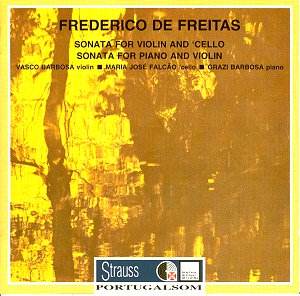
The 1923 piece is a very early work from a student at the Lisbon Conservatory.
Its polytonality is made all the starker by the placing of two string instruments
in such gaunt proximity. That Bachian severity is moderated by the folksy
dance figures of the Scherzo pittoresco (reminded me of the Mont
Juic Dances by Britten and Berkeley).
Fricker and Rawsthorne are the composers I thought of when hearing the post-War
angularities and accented cosmopolitan lyricism of the Violin Sonata - a
touch of John Ireland and Cyril Rootham here as well - especially the Rootham
sonata.
The composer was the artistic supervisor for these close-up recordings as
he was also for those by the Ploiesti Philharmonic.
All the soloists are sympathetic but Barbosa's warm and resinous tone is
outstanding as it was in the Portugalsom recording of the De Freitas Branco
violin concerto.
Rob Barnett

Postscript
I do hope that Portugalsom will go on to record more of de Freitas's works.
We need to hear the symphony Os Jerónimos, the orchestral work
Alexandre Herculano, the Missa Solene and the choral symphonic
As Sete Palavras de Nossa Senhora.
Lastly we should thank the Ministério da Cultura of Portugal. This
series (still growing) would not have been possible without their help. Would
that the UK government would look at funding British music of the period
1850-1980 on the same basis.
Rob Barnett
ORDERING DETAILS
These discs are available direct from Portugalsom-STRAUSS as follows:-
The prices are: UK pounds- 6 and US dollars -10 (freight not included).
Freight --- till 3 cd's --- not registered --- £2.40;registered----
£3.50
For USA --$ 10
Freight --till 3cd's -- not registered ---$5 ;registered ---- $6.80
We accept Visa or American Express
Credit cards are accepted with the name of the buyer, credit card number,
validity date and type of card.
Orders : to the attention of Eduarda Martins
by fax to the nº 351 21 7142353
By mail to :
Rua Adelaide Cabete,3C
1500-023 LISBOA
Portugal
phone 01 7151151 - 7143490 fax 01 7141723
by e-mail
strauss@mail.telepac.pt

